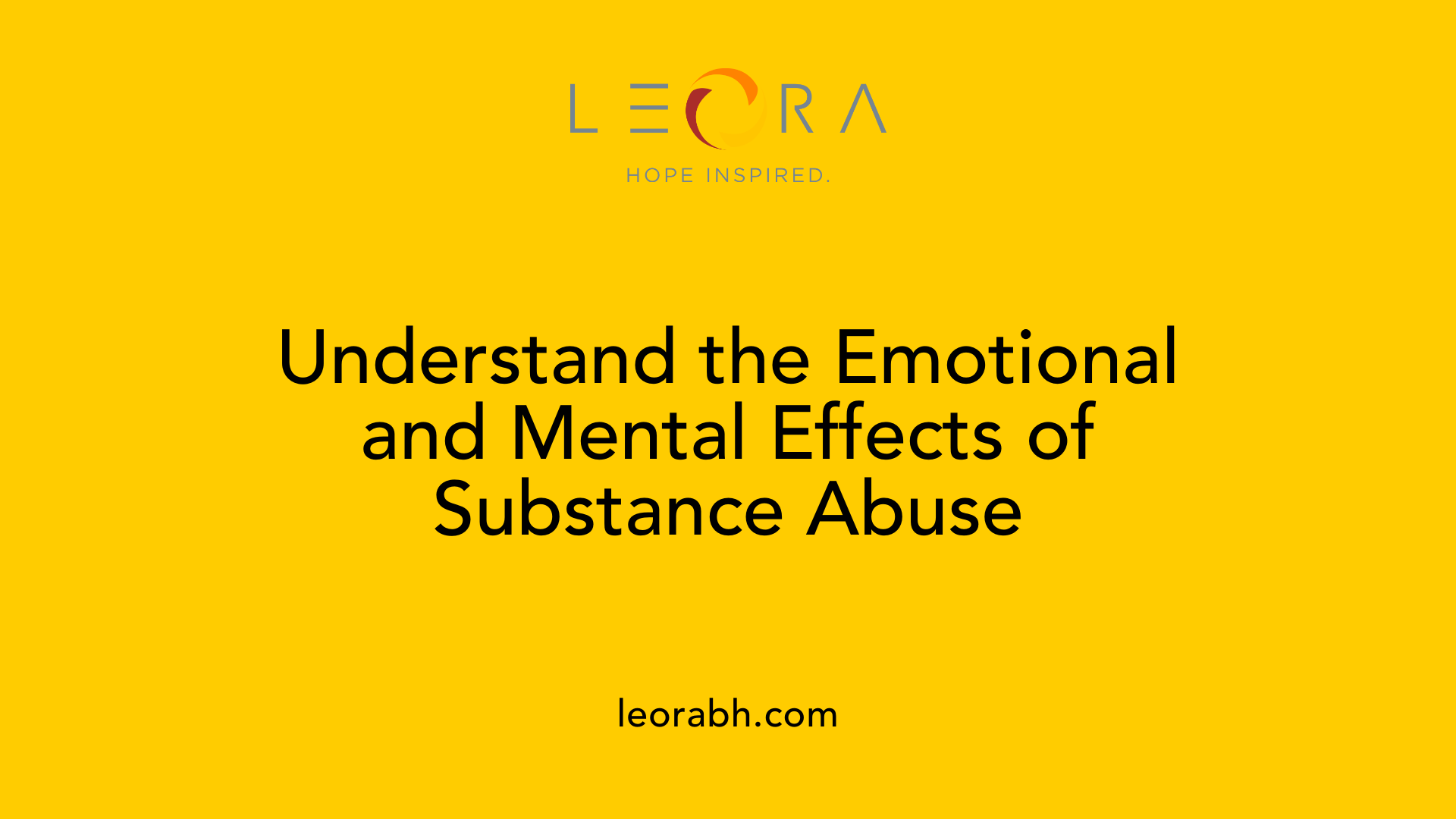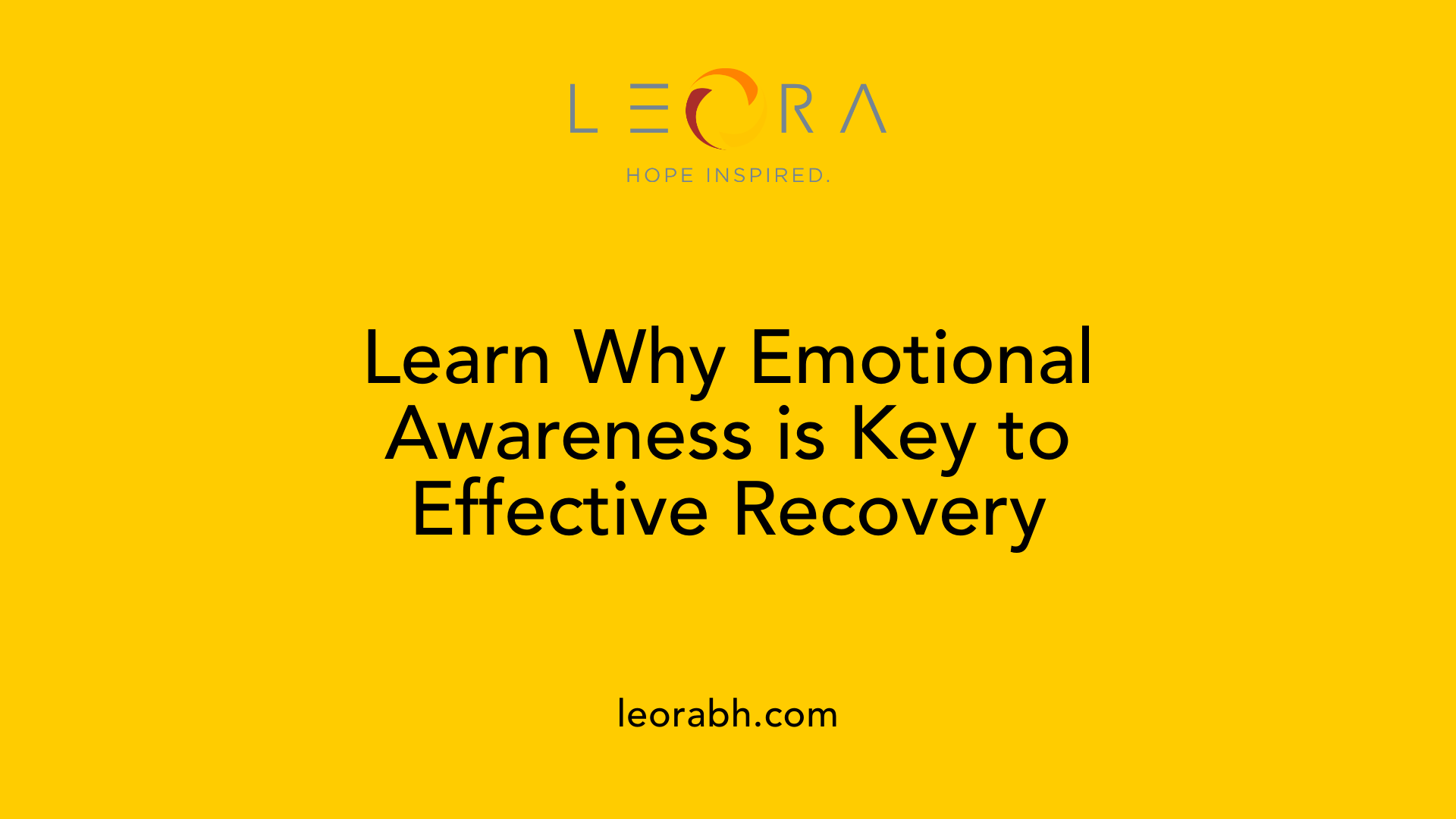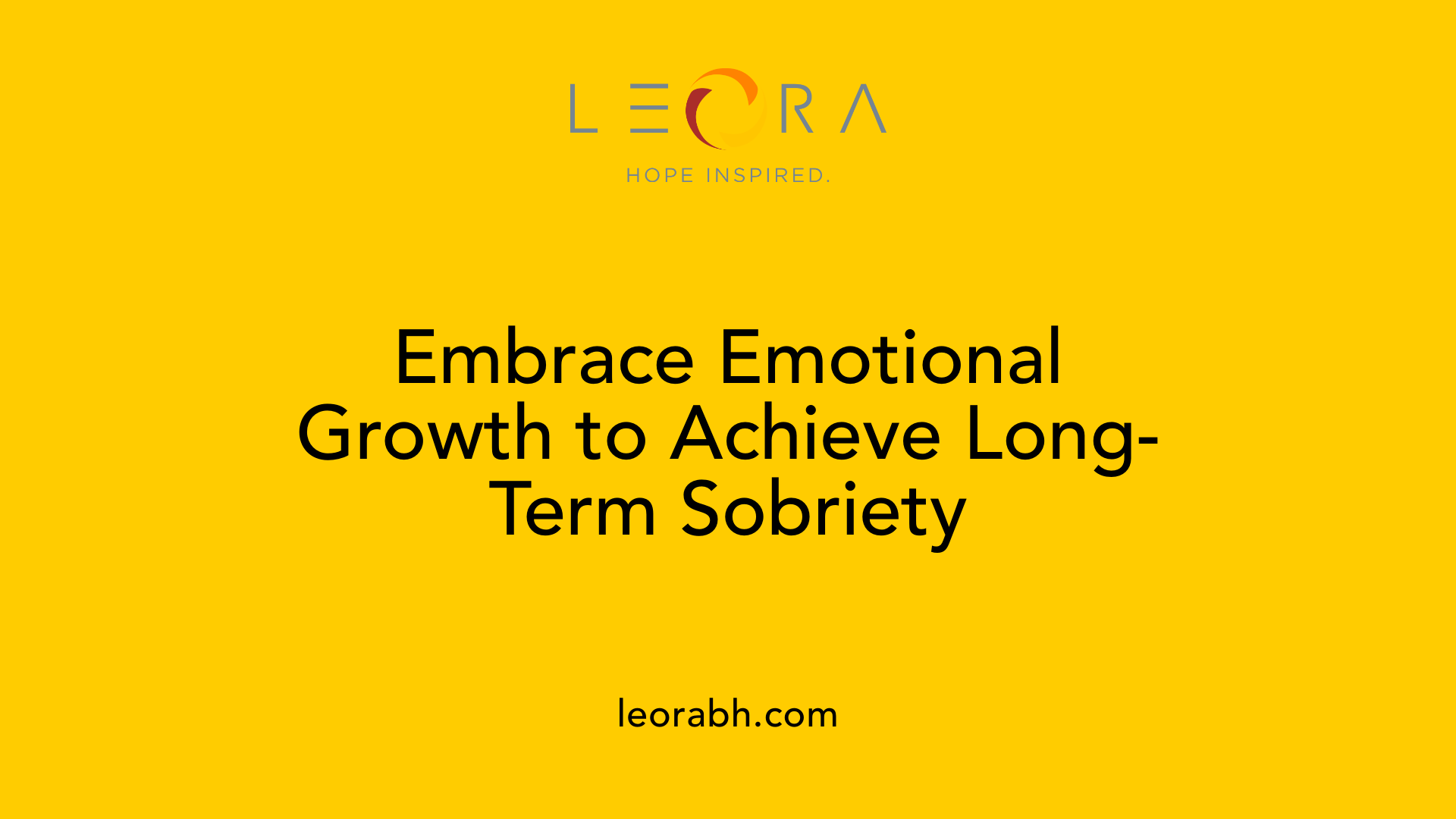Why Emotional Awareness Matters in Substance Use Treatment
The Crucial Role of Emotional Intelligence in Recovery Success
Understanding the Power of Emotional Skills in Addiction Treatment
In the complex journey of overcoming substance use disorder, emotional awareness and intelligence are vital components that can significantly influence treatment outcomes. Recognizing and managing emotions effectively helps individuals navigate the psychological landscape of recovery, improve relationships, and prevent relapse. This article explores why emotional awareness matters in substance use treatment, how developing emotional skills can impact recovery, and the therapeutic strategies that support emotional resilience.
Fundamentals of Emotional Intelligence and Its Components
What is emotional intelligence (EI)?
Emotional intelligence refers to the ability to recognize, understand, and manage our own emotions while also being aware of and responsive to the emotions of others. In the context of addiction recovery, EI plays a vital role by helping individuals develop healthier coping mechanisms, improve relationships, and prevent relapse.
Components of EI: self-awareness, self-regulation, motivation, empathy, social skills
EI is made up of five essential skills. Each contributes to emotional balance and resilience:
| Component | Description | How it supports recovery |
|---|---|---|
| Self-awareness | Recognizing and understanding your own emotions | Helps individuals identify emotional triggers, such as stress or anger, that might lead to substance use |
| Self-regulation | Managing emotions appropriately and staying calm | Supports coping with cravings and stress without turning to substances |
| Motivation | Inner drive to achieve and improve | Fosters commitment to sobriety and personal growth |
| Empathy | Understanding others' feelings | Reinforces healthy relationships and social support, reducing feelings of isolation |
| Social skills | Effective communication and conflict resolution | Rebuilds damaged relationships and strengthens support networks |
Why is emotional awareness important in substance use recovery?
Developing emotional awareness allows individuals to better understand their feelings and triggers. This understanding is crucial because many people turn to substances as a way to numb or escape difficult emotions. When someone can recognize these feelings early, they can employ healthier strategies to manage them.
By enhancing emotional awareness, individuals can proactively address emotional challenges such as anger, sadness, or anxiety. This reduces impulsivity and emotional distress that often lead to relapse. Moreover, being attuned to one's emotions promotes healthier communication, which strengthens support from loved ones. Overall, emotional awareness empowers individuals to handle life's challenges more effectively without resorting to substances, increasing the likelihood of sustained recovery.
The Impact of Addiction on Emotional and Mental Health

How addiction alters brain chemistry
Addiction fundamentally changes brain chemistry by disrupting neurotransmitter systems, particularly dopamine and serotonin pathways responsible for mood regulation and emotional responses. This chemical imbalance can lead to mood swings, irritability, and emotional numbness. Prolonged substance abuse diminishes the brain's ability to regulate these chemicals naturally, which complicates emotional stability even after stopping drug use.
Effects of substance abuse on mood and emotional regulation
Substance abuse often results in mood disturbances such as depression, anxiety, and anger. These emotional states can be both causes and consequences of addiction. For example, many individuals self-medicate with drugs or alcohol to cope with feelings of loneliness, sadness, or trauma. Over time, substances impair the brain’s natural capacity to manage emotions, making emotional regulation more challenging and increasing the risk of relapse during recovery.
The interplay between mental health disorders and addiction
Mental health issues like depression, anxiety, and post-traumatic stress disorder (PTSD) frequently co-occur with substance use disorders. These conditions can feed into each other—mental health symptoms may trigger substance use as a form of self-medication, while prolonged substance abuse can exacerbate mental disorders. Addressing this dual diagnosis requires integrated treatment approaches, including therapy and medication, alongside efforts to rebuild emotional health.
Why is emotional health crucial in overcoming addiction?
Having stable emotional health is essential for effective recovery. It helps individuals confront underlying issues—such as trauma or grief—that often fuel addictive behaviors. Good emotional well-being promotes better stress management, resilience, and positive coping skills.
Therapeutic interventions like cognitive-behavioral therapy (CBT), mindfulness practices, and holistic therapies support emotional resilience. Building a supportive social environment adds encouragement and accountability, further strengthening recovery efforts.
Ultimately, fostering emotional health addresses root causes, minimizes triggers, and enhances the likelihood of lasting sobriety. This comprehensive approach allows individuals to develop healthier mental habits and emotional responses, supporting long-term recovery.
Why Developing Emotional Skills Improves Treatment Outcomes

How can developing emotional skills impact treatment outcomes and relapse prevention?
Building emotional skills plays a vital role in improving recovery from addiction. When individuals enhance their self-awareness, they become better at recognizing emotional triggers that might lead to drug or alcohol use. This awareness allows for early intervention before cravings escalate.
Moreover, improving emotional regulation helps manage intense feelings like anger, anxiety, and depression that often accompany recovery. Techniques such as mindfulness, cognitive restructuring, and urge surfing help individuals stay resilient during challenging moments, reducing impulsive decisions to relapse.
Research shows that those with stronger emotional skills tend to have lower cravings and more confidence in their ability to stay sober. This sense of self-efficacy is crucial because it encourages continued effort and perseverance in recovery.
In essence, cultivating emotional intelligence offers a powerful coping toolkit. It guides individuals through emotional upheavals, making relapse less likely. Integrating emotional skill development into treatment plans significantly boosts the chances of long-term sobriety and overall well-being.
Managing Emotional Challenges During Recovery
What are some emotional challenges faced during recovery, such as anger, and how can they be managed?
Recovery from addiction often involves confronting a range of intense emotions, including anger, sadness, guilt, shame, anxiety, and fear. These feelings are natural responses as individuals work to rebuild their lives and manage underlying issues that may have contributed to their substance use.
Anger, in particular, can be a formidable barrier, triggered by perceived injustices, frustration, or setbacks. Managing such emotions starts with early recognition of triggers and signs. For example, noticing physical cues like muscle tension or a racing heart can signal rising anger, prompting the individual to pause.
Employing coping strategies such as deep breathing, imagery, or deliberate action plans helps reduce emotional intensity. Talking about feelings with trusted friends, family, or mental health professionals can diminish their power and offer a sense of support and perspective.
Techniques like urge surfing — riding out emotional cravings without acting impulsively — along with mindfulness practices, reinforce emotional awareness. These skills, often integrated into therapy programs like Cognitive Behavioral Therapy (CBT) and Dialectical Behavior Therapy (DBT), empower individuals to regulate emotions effectively, decreasing the risk of relapse.
Developing a toolkit of emotional management skills is essential for maintaining sobriety and fostering resilience in the face of emotional upheavals.
The Influence of Emotional Connection and Support Systems
Why is emotional health crucial in overcoming addiction?
Emotional health plays a vital role in overcoming addiction because it helps individuals address the underlying issues that often lead to substance use, such as trauma, grief, and mental health challenges. When emotional well-being is stable, it becomes easier to regulate moods, reduce stress, and resist cravings.
Building strong support networks is essential. Family, friends, and community groups can provide encouragement, understanding, and accountability. These connections foster a sense of belonging and help reduce feelings of isolation, which are common triggers for relapse.
Therapeutic strategies like psychotherapy, mindfulness practices, and holistic approaches support emotional resilience. They help individuals develop healthier routines, improve their self-awareness, and manage difficult emotions.
By focusing on emotional health, recovery efforts are better equipped to target the root causes of addiction, making long-term sobriety more achievable. In essence, nurturing emotional well-being through social support and effective treatment creates a more supportive environment for recovery.
The Importance of Emotional Awareness in Supporting Recovery Efforts

Why is awareness of substance abuse and emotional health important in recovery?
Understanding and recognizing early signs of substance use and mental health struggles is fundamental for effective recovery. When individuals are aware of how addiction impacts emotional well-being, they can identify warning signs such as mood swings, increased cravings, or withdrawal symptoms sooner.
This awareness helps in taking timely action, whether that means seeking professional help or engaging in healthy coping strategies. It also emphasizes the serious consequences of substance misuse—like damage to physical health, strained relationships, and financial difficulties—motivating individuals to pursue treatment before issues escalate.
Moreover, knowing the interplay between emotional health and addiction promotes understanding of available treatment options such as therapy, medication, and support groups. Recognizing these elements fosters resilience and reduces stigma, reinforcing that addiction is a manageable chronic disease rather than a moral failing.
By increasing awareness of the emotional triggers and underlying issues related to substance use, individuals can develop stronger self-efficacy and confidence in their recovery journey. Education and awareness are powerful tools that support long-term sobriety by encouraging proactive management of emotional health and fostering a supportive recovery environment.
Conclusion: Embracing Emotional Growth for Lasting Sobriety
 Developing emotional awareness is a fundamental component of successful addiction recovery. Recognizing and understanding one's emotions allows individuals to identify triggers, manage stress, and build resilience against cravings. This emotional clarity not only supports mental health but also fosters healthier relationships and a deeper self-compassion, which are essential for long-term sobriety.
Developing emotional awareness is a fundamental component of successful addiction recovery. Recognizing and understanding one's emotions allows individuals to identify triggers, manage stress, and build resilience against cravings. This emotional clarity not only supports mental health but also fosters healthier relationships and a deeper self-compassion, which are essential for long-term sobriety.
Continual skill development in areas such as self-regulation, empathy, and social skills is vital. These abilities help individuals navigate complex social environments, rebuild connections, and sustain motivation through recovery milestones. Incorporating therapies like CBT and DBT, along with mindfulness practices, can enhance emotional regulation and self-awareness, providing practical tools to manage emotional fluctuations.
A holistic approach that integrates emotional intelligence, mental health care, family support, and community involvement offers the most effective path forward. By focusing on emotional growth alongside physical recovery, individuals can cultivate a balanced, fulfilling life free from substance dependence.
Why is emotional health crucial in overcoming addiction? Emotional health addresses the underlying emotional and psychological issues that often drive substance use. It stabilizes mood, reduces anxiety, and improves coping strategies, thereby reducing relapse risks. Strengthening emotional resilience through ongoing learning and therapy transforms recovery from a temporary process into a lasting transformation, enabling individuals to face future challenges with confidence.
Fostering Emotional Awareness for Sustainable Sobriety
Developing a nuanced understanding of emotional intelligence and promoting emotional health are essential steps in the journey of addiction recovery. As evidence shows, emotional regulation, self-awareness, and strong social connections cultivate resilience, reduce the risk of relapse, and support overall well-being. Incorporating therapeutic modalities like CBT and DBT, along with fostering empathy and emotional connection, empowers individuals to navigate their emotional landscapes healthily. Emphasizing continuous emotional growth as part of recovery encourages a more holistic approach—one that not only targets the physical aspects of addiction but also nurtures the inner emotional resilience necessary for long-lasting sobriety.
References
- Building Emotional Intelligence in Addiction Rehab | Grand Falls
- Why Emotional Intelligence Matters in Addiction Recovery
- Depression, Anger, & Addiction: The Role of Emotions in Recovery
- The Importance of Emotional Connection in Addiction Recovery
- Emotional Intelligence: An Untapped Resource for Alcohol and ...
- Why Emotional Intelligence Is Vital for Recovery
- Understanding the Emotional Impact of Addiction - Relief
- Most Important Emotional Intelligence Skills in Recovery
- Assessing emotional intelligence domains and levels in substance ...
- Emotional Regulation In Recovery | Addiction Treatment
Find Your Inner Light
Related Articles
Schedule an Assessment
Leora Behavioral Health provides comprehensive treatment services, including ambulatory detox, mental health IOP, and SUD IOP, to support your journey toward lasting recovery.
Our caring team will guide you through the admissions process and create a personalized treatment plan tailored to your unique needs. We welcome walk-ins. If you or a loved one is struggling, reach out today. We’re here to help.


.svg)




.svg)
.svg)
.svg)
.svg)
